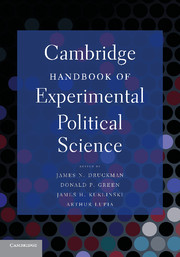Book contents
- Frontmatter
- Contents
- List of Tables
- List of Figures
- Contributors
- Acknowledgments
- INTRODUCTION
- PART I DESIGNING EXPERIMENTS
- PART II THE DEVELOPMENT OF EXPERIMENTS IN POLITICAL SCIENCE
- PART III DECISION MAKING
- PART IV VOTE CHOICE, CANDIDATE EVALUATIONS, AND TURNOUT
- PART V INTERPERSONAL RELATIONS
- PART VI IDENTITY, ETHNICITY, AND POLITICS
- PART VII INSTITUTIONS AND BEHAVIOR
- 24 Experimental Contributions to Collective Action Theory
- 25 Legislative Voting and Cycling
- 26 Electoral Systems and Strategic Voting (Laboratory Election Experiments)
- 27 Experimental Research on Democracy and Development
- PART VIII ELITE BARGAINING
- PART IX ADVANCED EXPERIMENTAL METHODS
- AFTERWORD
- Name Index
- Subject Index
- References
27 - Experimental Research on Democracy and Development
Published online by Cambridge University Press: 05 June 2012
- Frontmatter
- Contents
- List of Tables
- List of Figures
- Contributors
- Acknowledgments
- INTRODUCTION
- PART I DESIGNING EXPERIMENTS
- PART II THE DEVELOPMENT OF EXPERIMENTS IN POLITICAL SCIENCE
- PART III DECISION MAKING
- PART IV VOTE CHOICE, CANDIDATE EVALUATIONS, AND TURNOUT
- PART V INTERPERSONAL RELATIONS
- PART VI IDENTITY, ETHNICITY, AND POLITICS
- PART VII INSTITUTIONS AND BEHAVIOR
- 24 Experimental Contributions to Collective Action Theory
- 25 Legislative Voting and Cycling
- 26 Electoral Systems and Strategic Voting (Laboratory Election Experiments)
- 27 Experimental Research on Democracy and Development
- PART VIII ELITE BARGAINING
- PART IX ADVANCED EXPERIMENTAL METHODS
- AFTERWORD
- Name Index
- Subject Index
- References
Summary
Expectations about the role of democracy in development have changed considerably in recent years. In principle, the exercise of political rights sets democracies apart from other political regimes in that voters can pressure their representatives to respond to their needs. It has been argued that such pressure “helps voters constrain the confiscatory temptations of rulers and thereby secure property rights; increases political accountability, thus reduces corruption and waste; and improves the provision of public goods essential to development” (Boix and Stokes 2003, 538). Thus, the argument follows, democracy is development enhancing. Yet, deprivations such as malnutrition, illiteracy, and inequalities in ethnic and gender relationships have proven to be resilient, even within the nearly two thirds of the world's countries ranked as electoral democracies. The persistence of deprivations is a reminder that there is still a great deal to be learned about the relationship between democracy and development.
Not surprisingly, scholars have explored numerous ways in which democracy can be related to development, ranging from macropolitical examinations (e.g., are democracies better at producing development than are authoritarian regimes?) to microexplanations (e.g., under what circumstances can voters limit bureaucrats' rent-seeking behavior?). However, the bulk of empirical evidence in this respect is inconclusive (Przeworski and Limongi 1997; Boix and Stokes 2003; Keefer 2007).
- Type
- Chapter
- Information
- Cambridge Handbook of Experimental Political Science , pp. 384 - 396Publisher: Cambridge University PressPrint publication year: 2011
References
- 3
- Cited by



